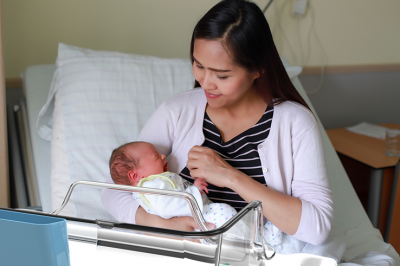UNC-Chapel Hill spin-out Couplet Care, Inc completes first commercial sales
An innovative hospital bassinet developed by a multidisciplinary team led by Kristin Tully, PhD, promises to better support new families through enabling breastfeeding, skin-to-skin contact and mother-infant bonding, while improving newborn safety. In 2016, NC TraCS funded the first phase of the project.
After childbirth, a mother's ability to see, touch and continuously respond to her newborn is a safety issue. Connections are also precious experiences. Research has shown that early postpartum connection supports breastfeeding, reduces stress and improves health outcomes for both mothers and their babies.
However, in many hospitals across the United States, the physical setup and equipment in rooms can make that access harder than it should be. Existing high-walled bassinets require a second adult to assist with basic infant care around the clock.
This gap in health care support is hazardous and inefficient. For some patients, the barrier means repeatedly pressing a call button and waiting for nursing assistance just to help get their baby. For others, it means missing out on the opportunities for responsive parenting and practicing safe infant sleep.
This led a team of maternal-child health experts at UNC-Chapel Hill to develop the Couplet Care Bassinet. Then-UNC Research Associate Kristin Tully, PhD, at the Gillings School’s Carolina Global Breastfeeding Institute developed and patented the bassinet, which is marketed at Couplet Care, Inc., a UNC spin-out company. With funding support from the Gillings School, the Couplet Care Bassinet was co-designed with end-users, and prototypes were independently evaluated through randomized controlled trials at UNC Medical Center and at Johns Hopkins. The result is a medical device that accommodates patient and clinician needs as part of respectful and supportive health care services.
This summer, Couplet Care reached a major milestone: completing its first commercial sales.
The Couplet Care team includes Stacie McEntyre, LCSW, CEO of Couplet Care, and co-inventor Tully, who is a medical anthropologist and the company's lead scientist and founder. UNC-Chapel Hill faculty co-inventors and Couplet Care clinical advisors are Catherine Sullivan, MPH, RDN, LDN, IBCLC, RLC, FAND, director of the Carolina Global Breastfeeding Institute and assistant professor at the UNC Gillings School of Global Public Health; Carl Seashore, MD, clinical advisor and professor of pediatrics; and Alison Stuebe, MD, distinguished scholar of infant and young child feeding at the Gillings School and professor of obstetrics and gynecology. Couplet Care is also supported by external maternity care experts and an experienced board.
“Couplet Care is thrilled to offer this innovation to improve quality care and promote positive postpartum experiences," said Tully. "The team is committed to strengthen patient safety and human connection."
She added that, "Moving from an evidence-based idea to a commercialized product is challenging. These first purchase orders are exciting, and we've navigated the complexity because we know the bassinet addresses such important needs." Hospitals in N.C. and Michigan have now purchased bassinets, with others across the country actively considering doing the same.
The Couplet Care Bassinet is the only postnatal bassinet that allows mothers to access their newborns without requiring a second adult to assist.
"Not all moms have partners, and not all partners can be present at birthing facilities throughout the day and night," said McEntyre. “So, the mom must call the nurse to pick up and set down the baby. This can sometimes result in long wait times with interactions and contribute to unnecessary risks. All moms should have independent access to their infants. This connection is especially critical for those recovering from C-sections, on magnesium, with disabilities or caring for infants born with neonatal opioid withdrawal syndrome."

The inaccessibility of infants rooming-in with standard bassinets, especially at night, can be frustrating for mothers and create unnecessary demands on clinical staff.
"The ways we treat people in the postpartum period are a demonstration of our values," said Tully. "All women should have autonomy, and after childbirth, they should be able to care for their infants and themselves as they need and desire without undue stress or pain."
The bassinet was first prototyped in partnership with N.C. State's College of Design and further developed with industrial design firm Trig Innovation. As a part of the human-centered design process, Tully led the collection of online feedback from across the country and the team engaged mothers, family members and clinicians in N.C. Both Carolina and Duke University simulation spaces have been utilized for formative and summative feedback from mothers and obstetric nurses.
"When people experience the bassinet for the first time, they respond with surprise and awe," said McEntyre. "Most ask why this device isn't already the standard of care."
In a National Institutes of Health (NIH)-funded trial, use of the Couplet Care Bassinet led to a 73% reduction in maternal calls for nursing during inpatient postpartum and a 60% reduction in infant time spent out of the hospital room for non-medical reasons.
"These findings have significant implications for clinical workflows, supporting breastfeeding and patient satisfaction," said McEntyre.
Bringing public health-rooted innovation to market has not been without its challenges.
"Academia, healthcare and industry are complex systems. Intervening at the intersection of them requires technical expertise, financial resources and resilience." Tully added. "The Couplet Care team is grateful for each other and appreciative of joining forces with so many people and organizations. Together, we have established a solution for public good that also results in financial returns for Carolina and investors."
The company is rapidly moving forward. Couplet Care is exhibiting the bassinet at medical and nursing conferences, offering purchase trials to selected hospitals across the U.S., and completing the Phase II SBIR project funded by the NIH.
"We are proud of the teamwork and results," said Tully. "Couplet Care is an example of translating evidence into practice. This work is also a demonstration that we can enhance healthcare systems to treat people with more dignity and respect."
To learn more, visit the Couplet Care website
Contact the UNC Gillings School of Global Public Health communications team at
Originally published at sph.unc.edu/sph-news.